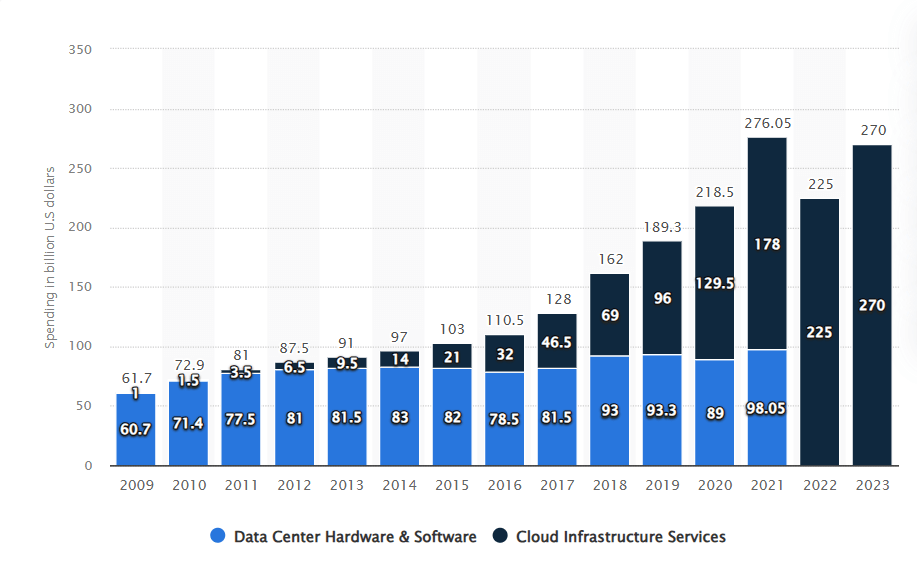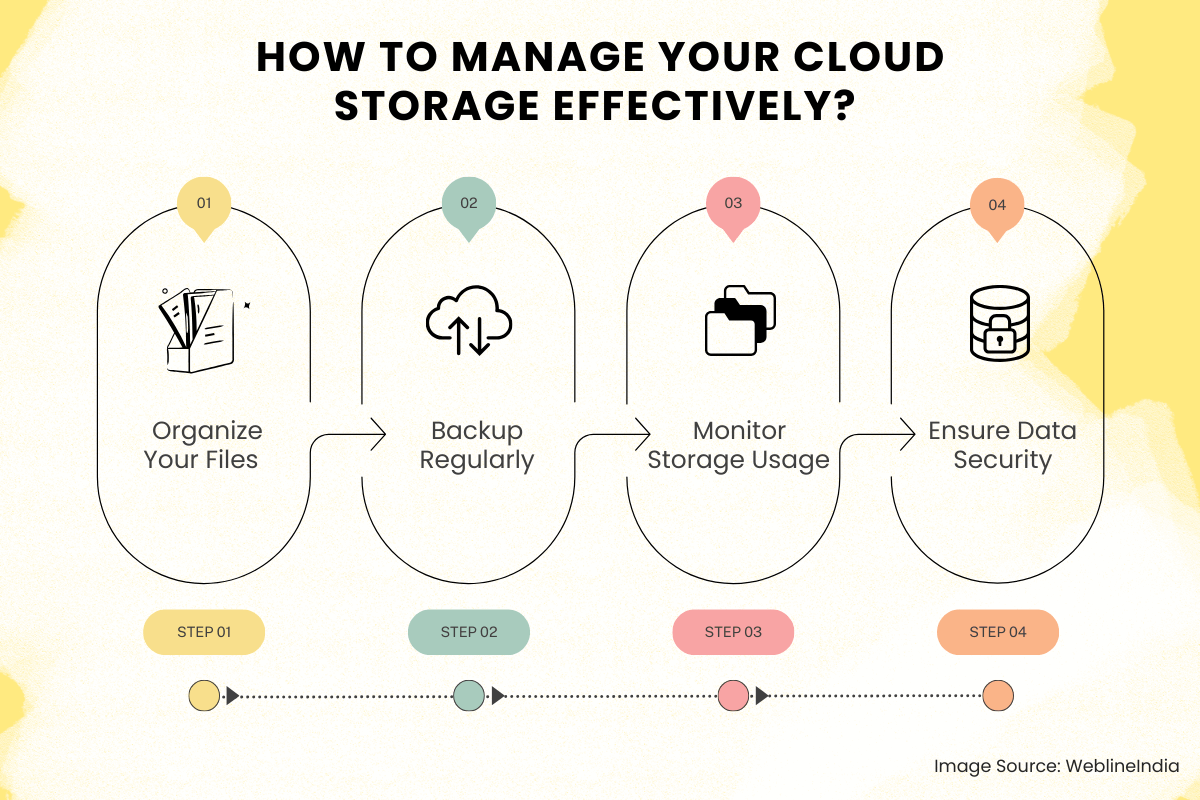Listen to the podcast :
As businesses and individuals increasingly transition their data to the cloud, understanding how to effectively manage cloud storage becomes crucial. The benefits are numerous: accessibility, scalability, and security. In 2023, enterprise spending on cloud infrastructure services reached 270 billion U.S. dollars. This was a growth of 45 billion U.S. dollars compared to the previous year, according to the research giant Statista. The growing market for cloud infrastructure services is driven by organizations’ demand for modern networking, storage, and database solutions.

However, to truly maximize the potential of cloud services, users need to grasp the technical details, make informed decisions, and follow best practices for data management. This means whether you’re using cloud services for business or personal purposes, proper management can transform your data handling processes.
This blog will guide you through the essentials of cloud storage and help you understand how to manage your data effectively in the cloud, ensuring seamless integration and maximum efficiency.
Need a better cloud storage strategy? Talk to our experts today!
Understanding Cloud Storage and Cloud Services
Before diving into how to manage cloud storage, it’s essential to understand what cloud storage is and the cloud services associated with it. Cloud storage allows users to save data on remote servers rather than local hard drives. This means you can access your data from anywhere at any time, provided you have an internet connection. Cloud services encompass not only storage but also a range of tools and features like computing, hosting, and data backup.
Types of Cloud Storage Solutions
When considering cloud storage for your data, there are several types to choose from:
- Public Cloud Storage: A third-party provider hosts this type, and data is accessible by multiple users over the internet.
- Private Cloud Storage: This is a more secure solution, hosted on a private network or data center, ideal for sensitive or proprietary information.
- Hybrid Cloud Storage: Combining both public and private clouds, hybrid solutions allow businesses to store critical data privately while using public cloud resources for non-sensitive information.
Each option offers distinct advantages, and understanding these will help you choose the best solution for your needs.
Benefits of Cloud Storage
1. Enhanced Scalability and Flexibility
Cloud storage offers unparalleled scalability. Businesses can easily increase or decrease storage capacity as needed, without the need for significant upfront investments or complex hardware upgrades. This flexibility enables organizations to adapt quickly to changing business demands and accommodate growth.
2. Improved Data Accessibility
Cloud storage provides seamless access to data from anywhere with an internet connection. This facilitates remote work, collaboration, and data sharing across teams and locations.

3. Enhanced Data Security
Reputable cloud service providers employ robust security measures, including encryption, access controls, and disaster recovery mechanisms, to protect data from unauthorized access, cyber threats, and data loss.
4. Cost-Effectiveness
Cloud storage can significantly reduce IT infrastructure costs associated with hardware, software, maintenance, and energy consumption. Pay-as-you-go pricing models further optimize costs by aligning storage expenses with actual usage.
5. Business Continuity and Disaster Recovery
Cloud storage enables robust business continuity and disaster recovery plans. Data redundancy and off-site storage minimize the impact of data loss due to hardware failures, natural disasters, or cyberattacks.
Is your cloud storage secure and optimized? Let’s audit your setup!
How to Manage Your Cloud Storage Effectively?
While cloud storage offers numerous advantages, it’s essential to follow best practices to make the most of it. Below are some strategies to effectively manage your data in the cloud:

1. Organize Your Files
One of the first steps in cloud storage management is organizing your files. Proper categorization ensures easier retrieval and keeps your cloud storage neat.
- Create folders for different types of files (e.g., documents, images, videos).
- Use clear, descriptive file names to make searching more efficient.
- Set up permissions and access controls to avoid unauthorized data access.
2. Backup Regularly
While cloud services offer robust data protection, maintaining a secondary backup strategy is always advisable. Regular backups ensure that in case of accidental deletion or file corruption, your data is recoverable.
3. Monitor Storage Usage
Many cloud service providers offer dashboards where you can monitor your data usage. This helps you avoid overuse and additional charges, which may arise when you exceed the storage limit. Set reminders for reviewing your usage periodically and make adjustments as necessary.
- Delete obsolete files.
- Archive older data to reduce primary storage consumption.
4. Ensure Data Security
Data security is a major consideration when managing cloud storage. Ensure that your cloud provider uses encryption protocols to protect data at rest and in transit. Implement strong password policies and enable multi-factor authentication (MFA) for added security.
- Regularly update security settings and software.
- Encrypt sensitive data before uploading to the cloud.
- Use access control lists (ACLs) to limit data visibility to authorized users only.
The Role of Offshore Software Development in Cloud Data Management
With the increasing popularity of cloud services, many businesses have turned to offshore software development to optimize their cloud-based systems. Offshore development teams are skilled at handling cloud infrastructure, data management, and security concerns, ensuring that your cloud storage operates smoothly and efficiently.
Offshore teams offer several advantages:
- Cost-Effectiveness: Offshore teams provide affordable pricing models for managing your cloud storage.
- Expertise: Skilled professionals bring in-depth knowledge of the best cloud practices, ensuring your data is optimized and secure.
- Scalability: Offshore developers can scale the team to meet the growing demands of your cloud services.
With their expertise, offshore development teams can streamline your cloud strategies, improve operational efficiency, and ensure that your cloud storage system remains optimized.
Offshore Software Development and Cloud Storage
Offshore software development companies often utilize cloud storage to streamline data management and collaboration. By utilizing shared cloud platforms, development teams can access and share code, project files, and other critical data seamlessly, regardless of their geographical location. This facilitates efficient communication, collaboration, and project delivery.
Security with WeblineIndia – An Offshore Cloud Solution Provider
WeblineIndia is a renowned offshore IT agency for DevOps and cloud consulting. You can be confident that your data is in safe hands. We prioritize data security and employ industry best practices to protect your sensitive information. Our robust security measures, combined with the inherent security benefits of cloud storage, ensure that your data remains protected and accessible at all times.
Undoubtedly, cloud storage has revolutionized the way businesses manage their data to offer enhanced scalability, accessibility, security, and cost-effectiveness. You can maximize the potential of cloud storage while ensuring the security and integrity of your valuable data by implementing effective data management strategies and partnering with a reputable offshore software development company like ours.
Conclusion
Effective cloud storage management is essential for businesses and individuals alike. With the right tools and strategies, you can take full advantage of cloud services to store, protect, and manage your data efficiently. Always prioritize security, organization, and scalability to optimize your cloud experience.
As you explore your cloud storage options, remember that choosing the right cloud services provider and partnering with the right experts can make all the difference. When you work with WeblineIndia, rest assured that we have the expertise, security measures, and resources to ensure your data is managed to the highest standards. Let us handle your cloud storage needs so you can focus on achieving your business goals.
Social Hashtags
#CloudStorage #DataManagement #CloudSecurity #CloudComputing #CyberSecurity #DataProtection #DigitalTransformation #TechSolutions #CloudBackup #SecureStorage #BusinessContinuity #CloudStrategy #ITSolutions #OffshoreDevelopment #CloudOptimization
Ready to optimize your cloud storage? Partner with us for secure and efficient solutions.
Frequently Asked Questions
Testimonials: Hear It Straight From Our Customers
Our development processes delivers dynamic solutions to tackle business challenges, optimize costs, and drive digital transformation. Expert-backed solutions enhance client retention and online presence, with proven success stories highlighting real-world problem-solving through innovative applications. Our esteemed clients just experienced it.










